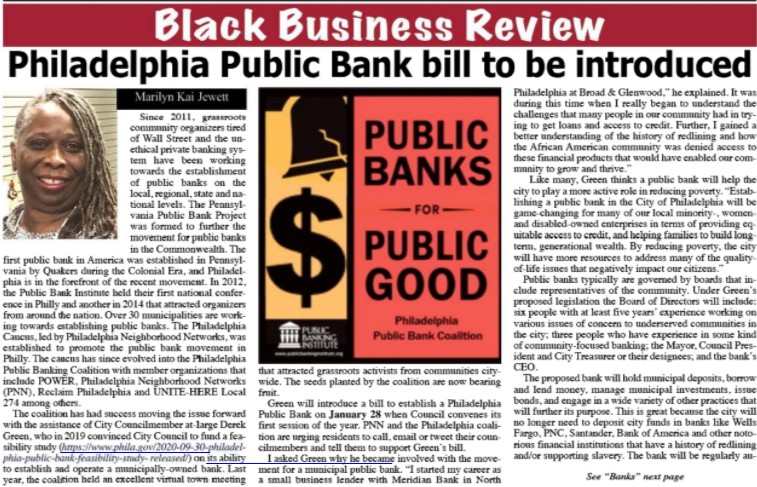Philadelphia Public Bank bill to be introduced
Article in Scoop USA Media’s Black Business Review by Marilyn Kai Jewett on January 26, 2021

Since 2011, grassroots community organizers tired of Wall Street and the unethical private banking system have been working towards the establishment of public banks on the local, regional, state and national levels. The Pennsylvania Public Bank Project was formed to further the movement for public banks in the Commonwealth. The first public bank in America was established in Pennsylvania by Quakers during the Colonial Era, and Philadelphia is in the forefront of the recent movement. In 2012, the Public Bank Institute held their first national conference in Philly and another in 2014 that attracted organizers from around the nation. Over 30 municipalities are working towards establishing public banks. The Philadelphia Caucus, led by Philadelphia Neighborhood Networks, was established to promote the public bank movement in Philly. The caucus has since evolved into the Philadelphia Public Banking Coalition with member organizations that include POWER, Philadelphia Neighborhood Networks (PNN), Reclaim Philadelphia and UNITE-HERE Local 274 among others.
The coalition has had success moving the issue forward with the assistance of City Councilmember at-large Derek Green, who in 2019 convinced City Council to fund a feasibility study (https://www.phila.gov/2020-09-30-philadelphia-public-bank-feasibility-study- released/) on its ability to establish and operate a municipally-owned bank. Last year, the coalition held an excellent virtual town meeting that attracted grassroots activists from communities citywide. The seeds planted by the coalition are now bearing fruit.
Green will introduce a bill to establish a Philadelphia Public Bank on January 28 when Council convenes its first session of the year. PNN and the Philadelphia coalition are urging residents to call, email or tweet their councilmembers and tell them to support Green’s bill.
I asked Green why he became involved with the movement for a municipal public bank. “I started my career as a small business lender with Meridian Bank in North Philadelphia at Broad & Glenwood,” he explained. It was during this time when I really began to understand the challenges that many people in our community had in trying to get loans and access to credit. Further, I gained a better understanding of the history of redlining and how the African American community was denied access to these financial products that would have enabled our community to grow and thrive.”
Like many, Green thinks a public bank will help the city to play a more active role in reducing poverty. “Establishing a public bank in the City of Philadelphia will be game-changing for many of our local minority-, women and disabled-owned enterprises in terms of providing equitable access to credit, and helping families to build long-term, generational wealth. By reducing poverty, the city will have more resources to address many of the quality of- life issues that negatively impact our citizens.”
Public banks typically are governed by boards that include representatives of the community. Under Green’s proposed legislation the Board of Directors will include: six people with at least five years’ experience working on various issues of concern to underserved communities in the city; three people who have experience in some kind of community-focused banking; the Mayor, Council President and City Treasurer or their designees; and the bank’s CEO.
The proposed bank will hold municipal deposits, borrow and lend money, manage municipal investments, issue bonds, and engage in a wide variety of other practices that will further its purpose. This is great because the city will no longer need to deposit city funds in banks like Wells Fargo, PNC, Santander, Bank of America and other notorious financial institutions that have a history of redlining and/or supporting slavery. The bank will be regularly audited, and all board members and employees will be subject to the city’s Ethics Code.
Other public banks like the Bank of North Dakota that was established in 1919, use their credit-generating ability for affordable housing production and preservation, clean energy, small businesses, public infrastructure and other programs important to the residents.
Green and supporters of a public bank think it can help to uplift and preserve neglected communities. “From a grassroots perspective, a public bank will offer opportunities for organizations and individuals to work and collaborate with the city to not only again access to credit but also to provide financial literacy and education for our community,” said Green.
The proposed bank would “provide financial resources at fair interest rates to credit-worthy Philadelphia residents and businesses that lack equitable access to existing sources of financing, particularly in communities that have suffered historical discrimination in credit markets.” According to the bill the bank will focus on financing projects dealing with renewable energy and energy efficiency enterprises; low-income housing availability; cooperative business development; enterprises paying family-sustaining wages; businesses creating new employment opportunities; transportation projects; and other activities that fill the needs of marginalized communities.
Green said he will work with his colleagues to address any concerns regarding the bill, and upon passage, will work with the city administration and constituents to create a public bank. Contact Green’s office at 215-686-3450 for more information on the bill.
Don’t wait for “leadership” to bring it to you. Step forward now and get involved for yourself and our future generations. Join the Philly coalition’s Public Banking Action Group (https://phillynn.org/issues-actions/public-banking/) or the Pennsylvania Project (https://www.publicbankingpa.org/index.php) to get involved.